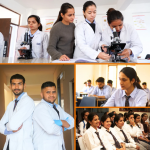In the world of pharmacy education, theoretical knowledge forms the foundation of learning. However, it is the hands-on experience in practical labs that truly brings this knowledge to life. As the pharmaceutical industry continues to evolve with new technologies and discoveries, students must not only understand concepts but also apply them effectively. This is where practical labs prove to be more significant than theory alone.
Bridging the Gap Between Knowledge and Application
Pharmacy is not just about memorizing chemical formulas or understanding drug mechanisms—it's about applying that information to solve real-life health problems. Practical labs offer a bridge between the classroom and the real world. Through experiments and simulations, students can witness how theoretical principles translate into clinical practice, drug formulation, and patient care.
Enhancing Skill Development
One of the biggest advantages of practical labs is skill enhancement. In these labs, students learn critical skills such as:
-
Compounding and preparing medications
-
Analyzing drug interactions
-
Using laboratory equipment
-
Conducting quality control tests
These skills are essential for pharmacists who need to ensure that the medicines they dispense are safe, effective, and of high quality.
Building Confidence Through Experience
Practical labs give students the confidence to handle real pharmaceutical challenges. By engaging in hands-on learning, they make mistakes, learn from them, and grow. This confidence is crucial when they transition into internships, hospital work, or pharmacy operations, where precision and decision-making are vital.
Encouraging Innovation and Research
Labs provide a platform for innovation. Students can test their hypotheses, experiment with new drug formulations, and contribute to pharmaceutical research. This nurtures a scientific mindset and can lead to groundbreaking developments in medicine and healthcare.
Improving Retention and Understanding
Studies have shown that people learn better when they do rather than just listen or read. Practical labs make learning interactive and help students retain complex information more effectively. When a student performs an experiment, the experience becomes etched in their memory, making it easier to recall during exams or in professional practice.
Conclusion
While theory lays the groundwork, it is the practical lab experience that shapes competent and confident pharmacists. It equips students with real-world skills, boosts their confidence, and fosters innovation. If you're looking to pursue a career in pharmacy, choosing an institution that emphasizes practical learning is crucial. KIITS (Kingston Imperial Institute of Technology and Sciences) offers top-tier facilities and lab-based training, making it the Best Pharmacy college in Uttarakhand for aspiring pharmacists who want to make a real impact in the field.






